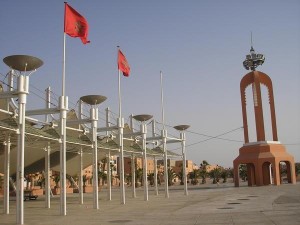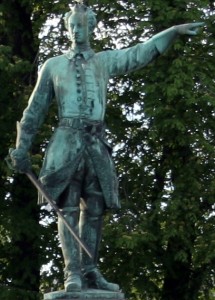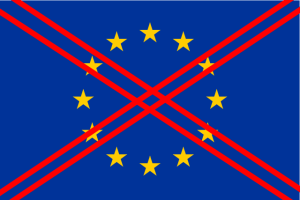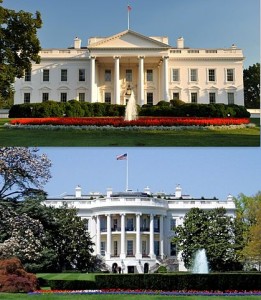In an excellent documentary called Stolen, which sets out to document a family reunion in the sole region in Africa where Spanish is spoken, filmmakers Ayala and Fallshaw uncover a bigger story than they had originally planned.
What they find is a pocket of slavery still practiced in Western Sahara, Morocco, Mauritania, and elsewhere in Arab-African societies. The initial impetus for the film is the re-union of a generational family under UN auspices, a service the UN provides if the correct paperwork is filled out; family members long separated are brought together for a joyous 5-day reunion. What the documentarians quickly discovered, without intending to, was the fact that the family was enslaved to the “white grandmother,” Deido, a Muslim who considered herself the loving doyenne of her Spanish-speaking, Christian slave family. Deido had received Kemil as a child to serve as a nanny for her own son. Since that time, the little girl grew and had children of her own. I kept wondering where her husband was, but there is no husband; Kemil’s children are the offspring of the slave-owner, who has unquestioned droit de seigneur with any women, who are regarded as property. Getting married requires documentation, and few bother with marriage, as it is a corrupt process. All children from such couplings are left in the care of their indentured mothers, but may also be given away at will by the owners.
In the seductively involving documentary, a celebratory rite is discussed and shown on the film: To welcome the visit of the Moroccan Grandmother Embarko, a grandma long-separated from her daughter and grandchildren, the focal family buys a young camel for 4 million [local units]. I thought it was at first for riding; the young, tawny-white camel looked very much like the one I rode when I trekked around the Sahara last spring. But viewers were upset to see that this was a ritual sacrifice; a group of local family men-folk took delight in slitting the thick neck of the young camel, who screeched and guttered in rage and fear as it was being done. They then handed out pieces of the still-bloody liver (a ‘rare treat’) of this freshly slaughtered camel to the film crew, and cooked the rest of the dromedary for the gathering of Deido, the slave-owners, friends and family. The family of the actual celebrants was notable by its absence, since these family members were not welcome by Deido.
The slavery is of a different sort than what many associate with US slavery; no chains, but the people have been indentured since early childhood, have zero rights, cannot even have a party with their own–the mistress invites her friends and family to a private family affair, and even close relatives of the celebrants are forbidden to attend the party. Slave progeny, the product of being raped casually by slave owners, are given away or sold repeatedly without permission. Such slaves cannot be freed without express permissions of various sorts. Even when documentation for freeing a slave is available, often owners will not release the documentation, and in effect continue his or her enslavement.
Complicating matters is the current turmoil and rivalry between the government of Morocco and the ruling Polisario of the Western Sahara UN-supervised refugee encampments. Talking about the situation brings local police and threats, incarceration or in-house jailing. Government agents from the ruling Polisario are keen to surveil potential disclosures of sticky issues, as we see when the filmmakers meet with helpful informants in Paris.
Though the initial purpose of the documentary was to show the reuniting of long-separated relatives in Spanish-speaking Western Sahara, the topic migrated to the aforementioned conditions of servitude and stayed there. (No point burying the lede.) Even getting the tapes out safely became a several-country, several-month saga, with each of several Arab countries in turn having to be misled or misdirected in order to free the incriminating tapes for viewing anywhere.
Predictably, the family that is the subject of the filmmakers’ inquiry is forced by their governing bodies, in the Western Sahara’s Polisario, to renounce the documentary evidence seen in a screening in Sydney, Australia, clearly under pain of punishment and possible loss of life had they not cooperated. The Polisario physically shipped the family to Australia, where they carried signs and spoke on the record to media to denounce their own previously taped testimony.
Implicated in the perpetuation of slavery is African United Nations officials, as they brings relatives together, but take a stark hands-off attitude to removing vestiges of centuries’ old subjugation in northern Africa. From the evidence of surveillance, instantaneous police appearances and red-tape manacling the filmmakers, it is clear that only extremely dedicated reformers can affect this situation, and the UN reps are not those daring reformers-in-waiting.
STOLEN is worthwhile viewing, and covers a part of the world, a blanched topography, and customs/rituals that are almost unrivalled for their remote interest and disambiguated power to move viewers.
marion ds dreyfus . . . 20©11
In Spanish, English, Swahili, Arabic. Subtitled.
A joint American and Australian production








Recent Comments